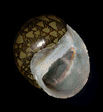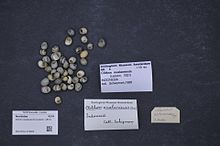| Clithon oualaniense | |
|---|---|

| |
| Clithon oualaniense shell | |

| |
| Clithon oualaniense shells | |
| Conservation status | |
 Least Concern (IUCN 3.1) | |
| Scientific classification | |
| Domain: | Eukaryota |
| Kingdom: | Animalia |
| Phylum: | Mollusca |
| Class: | Gastropoda |
| Subclass: | Neritimorpha |
| Order: | Cycloneritida |
| Family: | Neritidae |
| Genus: | Clithon |
| Species: | C. oualaniense |
| Binomial name | |
| Clithon oualaniense (Lesson, 1831) | |
| Synonyms | |
|
Neritina oualaniensis Lesson, 1831 | |
Clithon oualaniense is a species of brackish water snail with an operculum, a nerite. It is an aquatic gastropod mollusk in the family Neritidae, the nerites.
Distribution
This species occurs in Indo-Pacific region: Nansei-shoto in Japan, Hong Kong, Thailand, Peninsular Malaysia, Singapore, Jawa in Indonesia, Philippines, Papua New Guinea, Queensland in Australia India and Ceylon. It also occurs in American Samoa, Cook Islands, Fiji, French Polynesia, Guam, New Caledonia, Samoa, Solomon Islands and Vanuatu.
Description
The coloration pattern on the shell is very variable.
Ecology

Clithon oualaniense is a eurybiotic species. It inhabits soft bottoms of intertidal habitats. It can occur in high density, for example 347 snails per m² was recorded, that correspond to the biomass of 30.6 g per m². It also inhabits sea grass bed with Zostera japonica. The activity of Clithon oualaniense is diurnal; snails are active during the daytime and inactive at night. It bury itself into the mud, when the tide is high, probably to avoid water predators. They are on the surface feeding and mating when the tide is low.
Clithon oualaniense is herbivorous, feeding of microalgae and on detritus.
References
- ^ Köhler F. (2011). "Clithon oualaniensis". The IUCN Red List of Threatened Species 2011: e.T189178A8696900. Downloaded on 04 April 2016.
- Lesson R. (1830). Chapitre 9. Mollusques, Annélides et Vers. page 379. In: Duperrey L. I. (ed.) Voyage de la Coquille, Zoologie 2.
- ^ Rosenberg G. (2015). Clithon oualaniense. In: MolluscaBase (2015). Accessed through: World Register of Marine Species at http://www.marinespecies.org/aphia.php?p=taxdetails&id=737519 on 2016-04-04
- ^ Grüneberg H. & Nugaliyadde L. (1976). "Population studies on a polymorphic prosobranch snail (Clithon (Pictoneritina) oualaniensis Lesson). Philosophical Transactions of the Royal Society B 275(940): 385–437. doi:10.1098/rstb.1976.0088.
- Kumar P. S. & Khan A. B. (2013). "The distribution and diversity of benthic macroinvertebrate fauna in Pondicherry mangroves, India". Aquatic biosystems 9(1): 1. doi:10.1186/2046-9063-9-15.
- Gruneberg H. (1982). "Pseudo-polymorphism in Clithon oualaniensis". Proceedings of the Royal Society of London B 216(1203): 147-157. doi:10.1098/rspb.1982.0067.
- ^ Zvonareva S., Kantor Yu., Li X. & Britayev T. (2015). "Long-term monitoring of Gastropoda (Mollusca) fauna in planted mangroves in central Vietnam". Zoological Studies 54: 39. doi:10.1186/s40555-015-0120-0.
- ^ Takada Y. (2000). "Activity patterns of Clithon oualaniensis (Mollusca: Gastropoda) on intertidal seagrass beds in Hong Kong". In: The Marine Flora and Fauna of Hong Kong and Southern China V: Proceedings of the Tenth International Marine Biological Workshop: the Marine Flora and Fauna of Hong Kong and Southern China, Hong Kong, 6–26 April 1998 (Vol. 5, p. 217). Kent State University Press. 217-227.
- ^ Ohgaki S. I. (2001). "An example of activity pattern of the estuarine snails, Clithon faba and Clithon oualaniensis (Gastropoda: Neritidae) in the Nagura Lagoon, Ishigaki Island". Argonauta 4: 28-37. HTML.
External links
- Budiman A. (1988). "Aspect of ecology of Clithon oualaniensis (Gastropoda: Neritidae) on Sonneratia pioneer zone at Sosobok River, Kao Bay, Halmahera". In: Biological Systems of Mangroves, a Report of East Indonesian Mangrove Expedition, 1986. eds. K Ogino & M Chihara, Ehime University, 59-65.
- https://archive.org/stream/systematischesco210mart#page/192/mode/2up/
| Taxon identifiers | |
|---|---|
| Clithon oualaniense | |